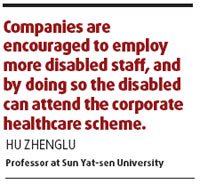
|
|
A Paralympic weightlifter does special hand-clapping pushups on Monday in Tianjin to prepare for the coming Paralympic Games. [Xinhua]
|
Kang praised the new plan as illustrative of China's support for its disadvantaged population.
"In the media, we always hear our national leaders say they would care for the disadvantaged. This time, we feel that is happening with the new medical care plan," he said.
Kang's family is among the luckier ones, as Beijing, which has more than 2,500 communities like Xiaoguan, is one of the first metropolitan areas in the country that has healthcare coverage for its entire population.
The new healthcare plan will benefit more than 470,000 of Beijing's 17 million citizens, according to the Labor and Social Security Bureau of Beijing.

Anhui province followed suit and launched the basic healthcare plan for its residents on Aug 1.
But for the most part of China, except cities in a number of developed provinces on the coast or in the east, the universal healthcare system has not been implemented.
This imbalance has become a major challenge for China's efforts to improve healthcare for the disabled, analysts have said.
China has about 83 million people with disabilities, according to the China Disabled Persons' Federation, who conducted a nationwide survey on the issue in 2006.
In richer regions, such as in the east and south coast provinces, healthcare for the disabled is much better than other parts of the country, Professor Hu Zhenglu of the public health department of Guangzhou's Sun Yat-sen University told China Daily.
"People with disabilities are now covered by healthcare schemes in cities like Guangzhou, Shenzhen, and Dongguan," Hu said.
The disabled in Xiamen, Fujian province, are also covered by a universal healthcare system.
But he also pointed out this is only because these cities already had universal healthcare for all local citizens, not because they have implemented any schemes exclusively for the disabled.
"Financial difficulty is still the key obstacle for many regions wanting to develop healthcare for disabled," Hu said.
In Tengzhou city of Shandong province, the local government recently launched a universal healthcare system about 10 days ago.
As part of the system, the city government would need to pay an extra of 1.6 million yuan a year to offer healthcare to about 20,000 people with severe disabilities, a local paper, Qilu Evening News, reported.
For the rest of the city's 80,000 disabled, 60,000 have minor disabilities. These would each need to pay 80 yuan a year to join the healthcare system, for 60 percent of their medical fees to be reimbursed.
The maximum reimbursement each can get from the plan is 110,000 yuan.
In rural areas, residents with disabilities are now encouraged to join the New Rural Cooperative Health Care Scheme, under which each need only pay 10 yuan a year.
In Daozhen, a remote rural county in mountainous Guizhou province, more than 25,000 of its 26,732 disabled residents have joined the scheme. The local government had also promised in June that any severely disabled person would be able to join the scheme at no cost.
In Yunnan province, also situated in the mountainous southwest region of the country, the provincial government has plans to cover all 2.88 million of its disabled residents under healthcare schemes within the next half decade, as Kunming Daily Newspaper reported.
Most parts of the country still have to rely on conventional measures such as offering employment opportunities to the disabled and establishing special social funds to take care of the group, Prof Hu said.
"This is similar to environmental protection, which requires a strong economic and financial base," Hu said.
"Companies are encouraged to employ more disabled staff, and by doing so the disabled can attend the corporate healthcare scheme," Hu said, adding that for those severely disabled, funds for their healthcare are also available.
The Disabled Persons' Federation has such special funds available nationwide, Hu said.
"In my field researches, I have also found many cities or counties setting up their own funds to offer healthcare to the disabled," he added.
"Administering all these public funds is one challenge," Hu said, adding that these measures also reflected poorer provinces making efforts to improve the situation.
Kang Zhixiang now feels his son should do his part to pay back society for the help it has given him.
"Except for a lower IQ, he is as strong as others in their 30s, so I think he should be able to manage simple part-time work like working in a nearby supermarket," Kang said.